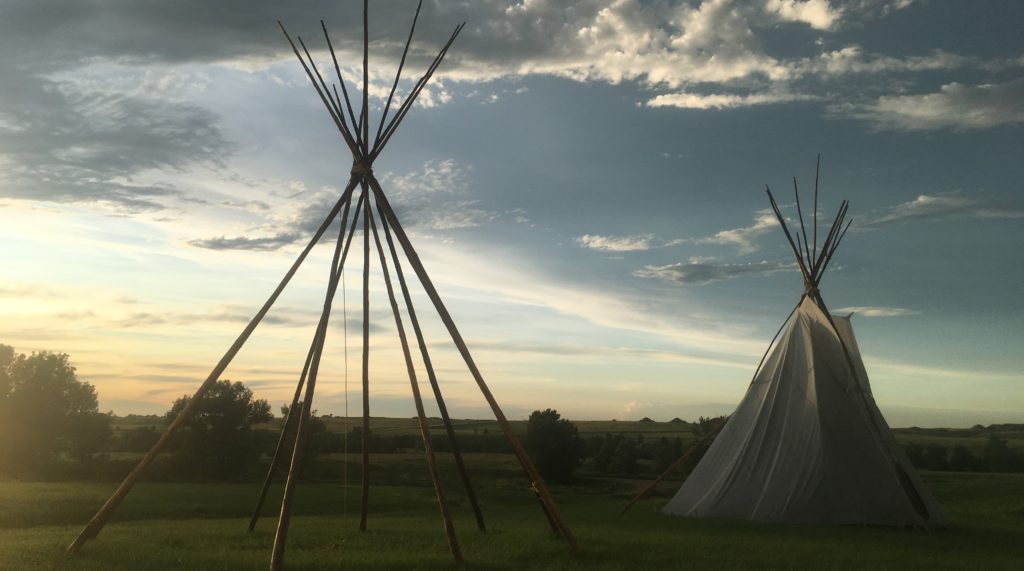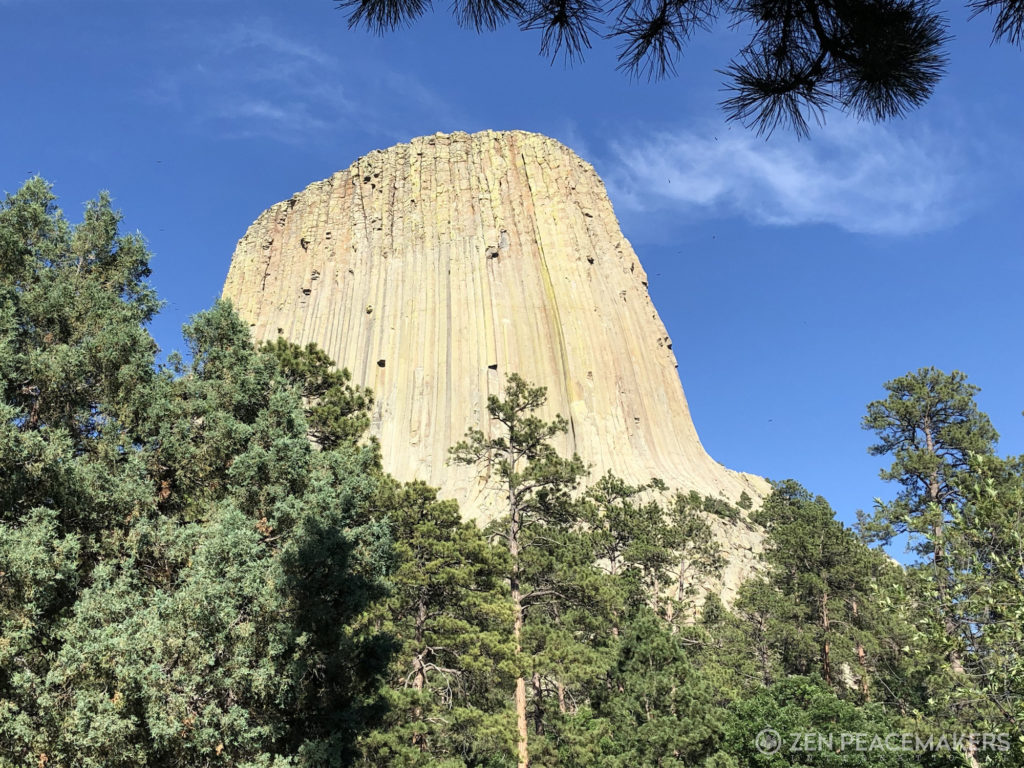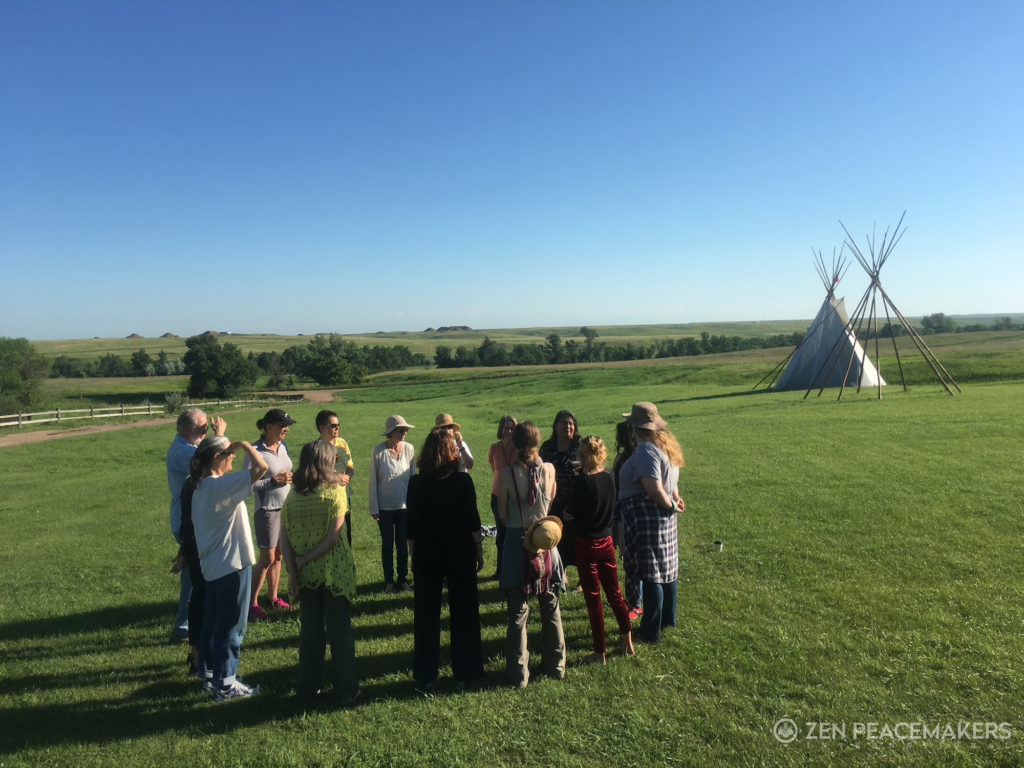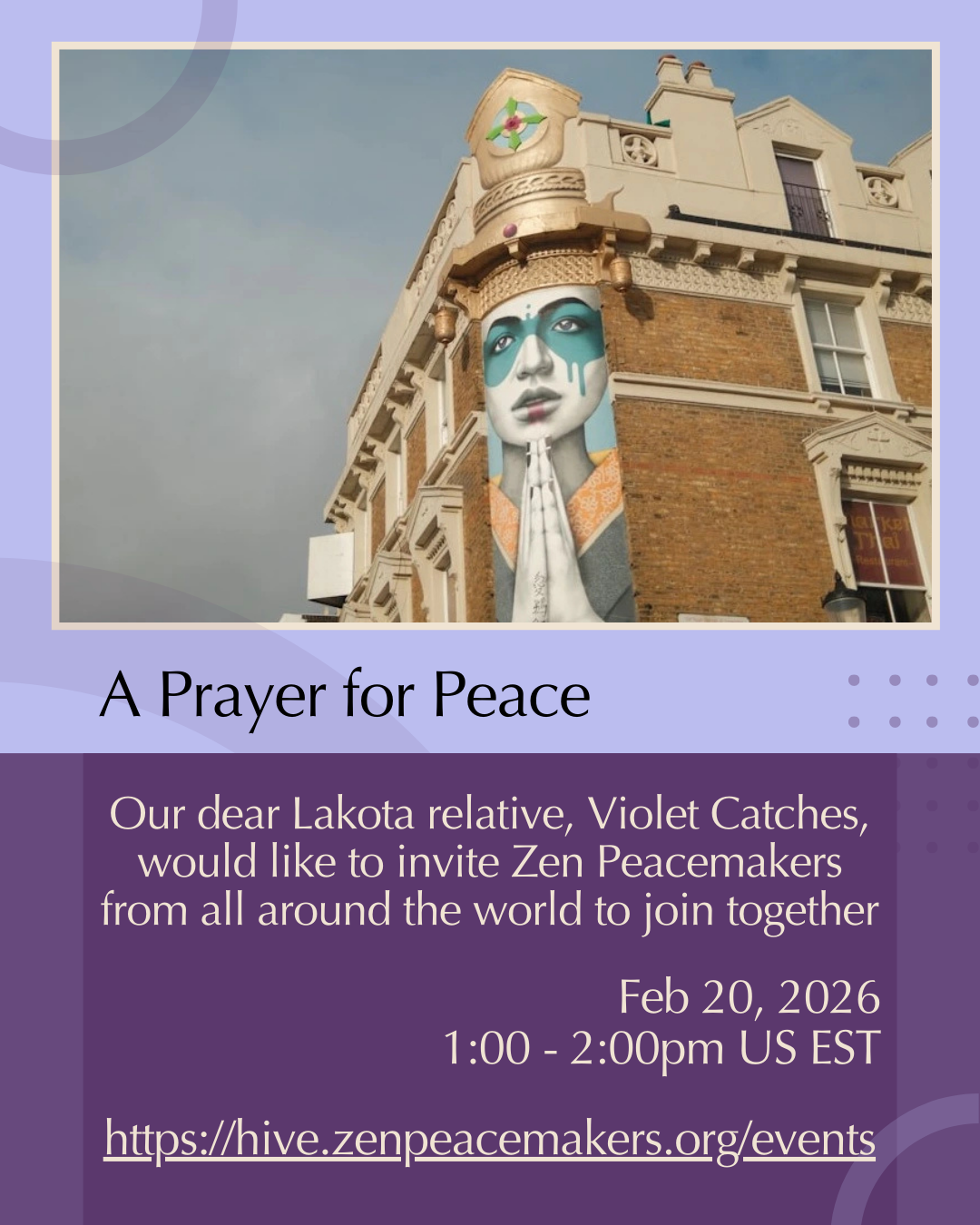Indianer-Zen-Friedensstifter
Retreat für Zeugen
Native American-Zen Peacemakers Bearing Witness Retreat 2023
Wolakota Makasintomni Awachekiyapi
Beten für heilige Harmonie
und weltweiten Frieden
Medizinrad in den Bighorn Mts. in Wyoming und auf dem Rosebud Battlefield in Montana
Sonntag, 9. Juli bis Samstag, 15. Juli 2023
DIE ANMELDUNG IST JETZT GESCHLOSSEN


Zen Peacemakers führt seit 1996 in Auschwitz, Ruanda und den Black Hills Zeugenexerzitien nach den Prinzipien des Nichtwissens, des Zeugnisgebens und des Handelns durch. Dieses Programm ist eine Fortsetzung dieses reichen Erbes und Teil unseres Engagements, in Verbindung mit den indigenen Gemeinschaften von Turtle Island zu wachsen.
In unserem Journal finden Sie Berichte und Reflexionen von unseren vergangenen Retreats.
Wir nehmen an einem Zen Peacemaker Bearing Witness Retreat teil
Wenn wir an einem Friedensprozess teilnehmen
Retreat-Info
KLICKEN SIE ZUM ANZEIGEN AUF DIE THEMEN
What Does The Retreat Fee Pay For?
Cancellation Policy
Fundraise Your Tuition/Mala Practice
DONATIONS
Cost for the Plunge is $750.00. Additional donations are encouraged to help cover costs and support. Participants will be responsible for all travel expenses, lodging and meals. Attendees are responsible for travel costs to and from the retreat locations, and all lodging and meal costs. Attendees are also responsible for making their own hotel reservations.
CANCELLATION & REFUND POLICY
Please note the following important dates for the cancellation and refund policy. All refunds are normally processed within 60 days of the notification of cancellation.
- If the retreat is canceled by Zen Peacemakers International, the registrants will receive full refunds of the paid registration fees.
- If a registration is canceled by the participant before June 1, ZPI will refund all but a $100 cancellation fee to help cover administration expenses.
- If a registration is canceled by the participant after June 1 but before, June 15, ZPI will refund all but a $300 cancelation fee to help cover administration expenses.
- The retreat fee becomes non-refundable if a registration is canceled by the participant after June 15.
- IMPORTANT NOTE: The participants are responsible for their own hotel reservations, cancellations, and the related fees/penalties.
Zen Peacemakers encourages everyone to fundraise their participation by reaching out to close ones and friends and by that to include others in what otherwise may be a very personal journey. You will also raise awareness for whatever causes or issues attending this retreat will address for you.
2,500 years ago, it was the practice of the lay congregation to support monks through donations of food and clothing. Shakyamuni Buddha led his monks each morning in the practice of begging for their daily food. Each day’s offering was received with thanks regardless of its nature or size. In this way the Buddha encouraged simplicity, the generosity of both giving and receiving, and undiscriminating appreciation.
We continue this begging practice by raising support for our work by assembling a mala, or beads that are strung together and worn like a necklace. Each bead represents a person who supports that member’s vision and work, and the entire mala represents the Member’s community of support.
This is a practice of giving and receiving. By asking for support from family, friends, and associates, we acknowledge that as individuals, we are limited in what we can do. We depend on the generosity of others to increase our membership, train more peacemakers, and develop and support more programs. This is one more way in which we bear witness in the interdependence of life.
Another important aspect of mala practice is the incorporation of the ministry of money in our program. The assembly of malas ensures that money management and fundraising are not seen as foreign to peacemaking work; instead, the give-and-take of money is the compassionate, unobstructed flow of energy that nourishes and transforms our activities.
Mala practice also gives us the opportunity to share our work with our families, friends, and associates. Most of us lead professional work lives and have families. By raising money for our Socially Engaged Buddhist work, we publicize its activities, and most important, our own commitment. By wearing the beads we have assembled, we take our supporters with us in our peacemaking endeavors and on Bearing Witness retreats such as at Auschwitz, thus making family and friends an intimate part of this peacemaking journey.
Assemble a mala (not from your personal funds) consisting of 18 small beads and one Buddha (large) bead or one of 108 beads and dedicate each bead to each of your donors. Beads from individuals or from groups or families are equally appreciated. When they offer a bead, they will be working, training, studying and traveling with you wherever you go.
Through the years the Zen Peacemakers have hosted countless nationalities, faiths and ethnicities on the retreat. Donations can be extended towards those from diverse backgrounds to contribute to the multifaceted experience of the retreat. Donation will also ensure the attendance of those challenged financially to gather the cost of tuition.
Donations can be made at the time of registration or online on our Donation Page.
Zen Peacemakers, Inc. is a 501(c)3 tax exempt organization for your tax purposes.
Peacemaking Process
Environment
When We Participate in
A Zen Peacemaker Bearing Witness Retreat,
We Participate in a Peacemaking Process
To Bear Witness is to have a strong glimpse into the truth that the life of the other is actually our own life itself, that we are, indeed, one body.
Our Bearing Witness retreats take place in places where deep human trauma occurred and where healing is endlessly needed. With our retreats we intend to contribute to this healing.
To do this we rely on the Three Tenets of the Zen Peacemakers. All aspects of the retreat are founded on these Three Tenets:
NOT-KNOWING
letting go of fixed ideas about ourselves, others, and the universe.
BEARING WITNESS
to both the joy and the suffering of the world.
TAKING ACTION
that arises from Not-Knowing and Bearing Witness.
These will be our anchors to which we will return throughout each day of the retreat. They are a powerful way to live one’s life and respond to the needs of the world.
While a Bearing Witness Retreat cannot precisely be a Zen Sesshin, we do create a container of intention and awareness we all share the responsibility to maintain. Moving as one, sharing meals, adhering to the schedule, and attending all activities are part of this. Everyone is asked to maintain presence and attention throughout the retreat as each setting allows.
Often, we experience strong emotions and reactions in these places of profound human trauma. Our retreat is designed to support us, with Council practice, meditation periods, prayer sessions, and the presence of senior Spirit Holders who are available to you if you need them. All of us should remain vigilant about how our fellow participants are doing. These reactions can be transformative, and we want to protect the space to fully experience them.
Please prepare to arrive with this spirit in heart and mind.
Refer to the webpage on the Three Tenets to learn more
(https://zenpeacemakers.org/the-three-tenets/)
and contact a retreat leader if you have questions.
Please be aware we will be outdoors most days. The weather in the Black Hills in July can vary widely. At times we will be between 4,500 and 5,000 feet above sea level, and will need to walk / hike a little. Please consider your health and fitness.
Ethical Guidelines
Staffing
Suggested Readings
ETHICAL GUIDELINES
Bearing witness retreats often take us to places of deep suffering and even trauma. Participants are encouraged to bear witness not just to certain external and historical events, but also to personal issues of vulnerability and darkness. While the entire staff, including spirit holders, council facilitators, religious leaders and coordinators, tries to create a retreat environment that serves these goals, it is the responsibility of all of us, staff and participants alike, to maintain this environment for the sake of all participants. For this reason I agree to uphold this Code of Ethical Conduct, which is based on principles of trust, integrity, justice, respect and accountability, in order to nurture this bearing witness retreat.
I understand that this retreat provides an opportunity to practice the Three Tenets of the Zen Peacemakers: (1) Not Knowing, (2) Bearing Witness, and (3) Taking Action from Not Knowing and Bearing Witness.
>> Accountability. Maintaining the well-being of the retreat is the mutual responsibility of all participants. I agree to consciously cultivate a space where all voices and opinions are heard, the diversity of individual experiences is affirmed and encouraged, and where all participants feel safe in sharing personal shortcomings and concerns. Clear communication supports taking responsibility for both oneself and the retreat, and is thus an act of service to all participants.
>> Transparency. Transparency is crucial to maintaining balance and harmony. I will speak out on matters that, if left unaddressed, may foster doubt, suspicion or resentment.
Self-Awareness. Knowing that this retreat may be arduous to both mind and body, I will take responsibility for monitoring and caring for myself.
>> Right Speech. Mutual respect manifests when we treat each other with dignity and engage with everyone truthfully and compassionately. Harmony is promoted when I observe right speech: refraining from lies, self-serving talk, slander, or apportioning blame. It also includes proactively and skillfully speaking out in a manner that respects all persons involved. Recognizing the potency of anger, I will practice self-awareness and endeavor to express myself openly and generously, without blame or rejection.
>> Confidentiality. I understand that the retreat includes processes and procedures that may involve the sharing of sensitive personal information, and that this information should be held in confidence as much as possible. This caution particularly applies to staff members. On those occasions when, for the well being of specific individuals, staff members need to consult with each other, such consultations will be maintained in confidence.
Boundaries. I am responsible for clarifying, maintaining and communicating appropriate and clear boundaries with other participants.
>> Sexual Conduct. I acknowledge that sexuality is a highly vulnerable part of human experience, and even more so in retreats that challenge our bodies, minds and hearts. For this reason I will not form a new sexual relationship during the retreat with other retreat participants.
>> Use of Intoxicants. I understand that clarity of mind is a fundamental component of the practice of the three tenets. The use of non-medically prescribed intoxicants during retreats is acceptable only when prescribed by the retreat staff.
>> Practices Outside the Scope of the Retreat. All activities should support the purpose of this retreat as declared in the advertised description. No staff member or leader can give teachings or practices that lie outside its purview. Any doubts or questions about this should be taken to the spirit holders for resolution.
When you participate in a Bearing Witness retreat, you enter a carefully crafted container held by various teams:
Spirit Holders learn and listen to the pulse of the retreat during the retreat, and adjust the schedule accordingly. This role is specific to the retreat they have been chosen for. They review the retreat structure and schedule and make recommendations for changes. The Spirit Holders include (1) individuals whose lives are deeply infused with the place and theme of the retreat, (2) Zen teachers or Masters with extensive experience in the practice and teaching of the Three Tenets and (3) Those with a particular role, such as Head of Logistical Staff and Head Council Trainer.
Staff serves the needs of the retreat and its participants by translating the direction of the spirit holders into action.
Council Facilitators lead the council groups – sharing circles that give space for sharing one’s experience of the retreat with others.
- American Carnage: Wounded Knee, 1890, by Jerome A. Greene
- All the Real Indians Died Off, by Roxanne Dunbar-Ortiz and Dina Gilio-Whitaker
- An Indigenous Peoples’ History of the United States, by Roxanne Dunbar-Ortiz
- Black Elk Speaks, By John Gneisenau Neihardt
- Bury My Heart at Wounded Knee, by Dee Brown
- God’s Red Son, by Louis Warren
- Good Friday on the Rez, by David Hugh Bunnell
- I Am a Man: Chief Standing Bear’s Journey for Justice, by Joe Starita
- In the Spirit of Crazy Horse, by Peter Matthiessen
- Lakota Star Knowledge, by Ronald Goodman
- Native American Postcolonial Psychology, by Eduardo Duran and Bonnie Duran
- Neither Wolf nor Dog, by Kent Nerbern (Also a Movie Recently Released)
- Oceti Wakan: Sacred Fireplace, by Pete Catches Sr
- Prison Writings, by Leonard Peltier
- Quiet Until the Thaw, by Alexandra Fuller
- Standing in the Light, by Severt Young Bear
- The Journey of Crazy Horse: A Lakota History, by Joseph Marshall III
- The Killing of Crazy Horse, by Thomas Power
- The Land Along The River: The Ongoing Saga of the Sioux Nation Land Claim, 1851-2012, by Peter Capossela
- The Ghost Dance Religion and Wounded Knee, by James Mooney
- Xeyata: Up on the Mountain, by Violet H. Catches

Mitakuye Oyasin – all meine Verwandten –– ist ein wesentliches Lakota-Verständnis, und Zen Peacemakers fühlt sich geehrt, unsere Beziehung zu den Lakota und anderen eingeborenen Stämmen in den Black Hills weiter zu vertiefen. Obwohl formelle Programme erst vor kurzem begannen, sind sie das Ergebnis einer 18-jährigen Beziehung zwischen Lakota-Personen und Zen Peacemaker-Mitgliedern.
Seit 2015 führen Zen Peacemakers jährlich Programme in Zusammenarbeit mit der Gemeinschaft der amerikanischen Ureinwohner in South Dakota durch. Diese Programme sind jedes Jahr anders, je nach den Bedürfnissen unserer Gastgeber und unserer Teilnehmer: Sie haben sich 2015 als das große Black Hills Bearing Witness-Retreat mit 180 Teilnehmern manifestiert, das intime von Mitgliedern geführte Plunge im Jahr 2016 im Cheyenne River Sioux Tribe Reservation (CRST) und die dualen Programme im Jahr 2017 einer Dienstwoche zu CRST und dem Bearing Witness Plunge in Montana, Wyoming und South Dakota.
Jedes Jahr in Folge baut auf den Beziehungen auf, die wir mit unseren Gastgebern aufbauen. Und unsere Programmteilnehmer haben ihre Beziehungen individuell durch Kommunikation und Aktionen fortgesetzt, wie eine landesweite Kleideraktion, Kooperationen im Bereich soziale Gerechtigkeit, ihre Anwesenheit beim Standing Rock Camp im Winter 2016, ein von Mitgliedern geführtes Bearing Witness Retreat in Minnesota, Gebäude ein ganzjähriges Treibhaus in Pine Ridge und in vielen anderen Formen. Einige dieser Geschichten werden in unserem Online erzählt Tagebuch .
Unsere Lakota-Freunde werden mit ihren tiefen Reserven an Demut, Glauben und Ausdauer den Weg weisen. Wir werden ihnen mit tiefem Zuhören, Respekt und der Absicht begegnen, neue Saat der Fürsorge, des Vertrauens und des Wohlbefindens für alle unsere Beziehungen zu säen.
Dieses Programm wird vom Führungsteam und im Geiste der Drei Grundsätze der Zen-Friedensmacher durchgeführt. Obwohl es eine festgelegte Struktur und einen von den Leitern unterstützten Rahmen gibt, beachten Sie bitte, dass sich die Tagesordnung jederzeit ändern kann, da wir von Moment zu Moment und von Tag zu Tag Zeugnis geben von dem, was sich ergibt. Flexibilität ist unabdingbar.
Die Absichten und der Geist dieses Programms werden von den Programmleitern sorgfältig und subtil gepflegt. Bitte beachten Sie deren Anweisungen.


